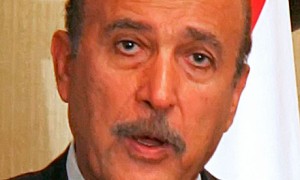
Egypt’s new cabinet has announced a 15% rise in salaries and pensions in an attempt to draw the sting from the public protests that have convulsed the country, threatening to drive Hosni Mubarak out of power after 30 years.
The increase for public sector workers followed earlier proposals for greater political freedom that have yet to convince pro-democracy protesters to leave Tahrir Square after two weeks of unrest that have claimed up to 300 lives.
The new finance minister, Samir Radwan, says some 6.5bn Egyptian pounds ($960m) will be allocated to cover the increases, which will take effect in April for the 6 million people on the public payroll.
State TV also announced that the family of a Google marketing manager who helped organise the anti-Mubarak demonstrations, has been told he will be released from prison. Wael Ghonim was one of the most prominent youth organisers of the protests and was seized by security agents last month.
But the concessions were unlikely to win over protesters, who insist that Mubarak should go now and not in September, when new elections are due to be held.
“Our main objective is for Mubarak to step down,” said student Muhammad Eid. “We don’t accept any other concessions.”
Rami Ghoneim, an unemployed internet activist, said the protesters were in no rush to leave so long as their key demand was not met. The longer they stay, he said, the more concessions the regime offers.
“It is like a wound, the more you press on it the more blood gushes out. We will press until we empty it,” he said.
Attempts by the government to portray the country as returning to normal since the protests began on 25 January, following the upheaval in Tunisia, were less than convincing. Banks reopened after a week-long closure with queues of customers but hours, and withdrawals, were limited. The stock market, which was due to reopen, remained closed, although traffic was returning to ordinary levels in many places.
Despite pledges of press freedom, the government moved to clamp down on foreign coverage by demanding that overseas journalists be accredited by the Egyptian authorities before being granted access to Tahrir Square. Egyptian security forces also continued to round up protesters.
Security agents wearing body armour and carrying automatic weapons arrested three men inside the foreign ministry and bundled them into the back of a van and driving off. Asked who the men were, a guard on the gate at the ministry said “opposition”.
More activists have been arrested, it was reported, including an independent film maker, Samir Eshra, and Abdel-Karim Nabil Suleiman, who blogs under the name Karim Amer. Amer was the first blogger to be prosecuted in the country when he was jailed for four years in 2007 for insulting Islam and the president. He was released last November.
A symbolic funeral was held in Tahrir Square for the first journalist to be killed in the unrest, Ahmad Mohamed Mahmoud, a photographer with Al-Ta’awun.
Keen to get traffic moving around the square, the army tried early on to squeeze the area the protesters have occupied. Overnight campers rushed out of their tents to surround soldiers attempting to corral them into a smaller area. Wary of the army’s effort to gain ground to try and restore the traffic flow in central Cairo, dozens of protesters slept inside the tracks of the army vehicles.
“The army is getting restless and so are the protesters. The army wants to squeeze us into a small circle in the middle of the square to get the traffic moving again,” protester Muhammad Shalaby, 27, told Reuters by telephone.
“Things are stable. I can’t say they’re good, but they’re not collapsing,” said a trader at a Cairo-based bank.
Egypt’s state-run news agency reported that Mubarak ordered the country’s parliament and its highest appellate court to re-examine lower court rulings disqualifying hundreds of ruling-party MPs for campaign and ballot irregularities that were ignored by electoral officials.
The ruling National Democratic party won more than 83% of the 518 seats in the 2010 parliamentary elections. Implementing the rulings against NDP MPs could cause many to lose their seats and force the dissolution of the parliament and new elections if enough are disqualified.
In other measures aimed at placating protesters, judicial officials promised to start the questioning on Tuesdayof three former ministers and a senior ruling party official who were accused of corruption after they were dismissed by Mubarak last week. The cabinet reshuffle was intended to placate protesters by removing some of the most hated officials in the government.
As Egypt’s political crisis continued to play out, the Egyptian pound hit its lowest level against the US dollar in about six years. The dollar was trading at about 5.953 Egyptian pounds by midday, its lowest since January 2005.
The government, meanwhile, is to auction 15bn Egyptian pounds in treasury bills to raise cash. The confidence-building measure comes amid worries about capital outflows and a sharp drop in foreign investment.
“Local banks have enough capacity to take up the issue, and I don’t think the central bank would take up an issue of this size if they weren’t confident it would be successful,” said Ahmad Alanani, director of Mideast fixed income sales at Exotix in Dubai. “A successful auction of this size taken up by local banks would send all the right signals that the Egyptian debt markets are back in business,” he added.
The Egyptian government has offered a series of concessions at the first talks with opposition groups, including the Islamist Muslim Brotherhood, in an attempt to end the mass pro-democracy protests across the country. But opposition leaders said Egypt’s vice-president and long-time intelligence chief, Omar Suleiman, did not go far enough in his proposals.

Leave a Reply
You must be logged in to post a comment.